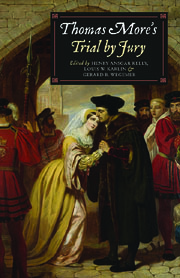Book contents
- Frontmatter
- Contents
- List of Contributors
- Preface
- Abbreviations
- Chronology
- 1 A Procedural Review of Thomas More's Trial
- 2 Natural Law and the Trial of Thomas More
- 3 A Guide to Thomas More's Trial for Modern Lawyers
- 4 Thomas More's Three Prison Letters Reporting on His Interrogations
- 5 Judicial Commentary on Thomas More's Trial
- Appendix 1 Documents
- Appendix 2 Thomas More's Trial: Docudrama
- Bibliography
- Index
3 - A Guide to Thomas More's Trial for Modern Lawyers
Published online by Cambridge University Press: 05 February 2013
- Frontmatter
- Contents
- List of Contributors
- Preface
- Abbreviations
- Chronology
- 1 A Procedural Review of Thomas More's Trial
- 2 Natural Law and the Trial of Thomas More
- 3 A Guide to Thomas More's Trial for Modern Lawyers
- 4 Thomas More's Three Prison Letters Reporting on His Interrogations
- 5 Judicial Commentary on Thomas More's Trial
- Appendix 1 Documents
- Appendix 2 Thomas More's Trial: Docudrama
- Bibliography
- Index
Summary
Introduction
The trial of Sir Thomas More is a touchstone for examining our sense of injustice, whether understood in terms of legalistic notions of due process or in the most fundamental sense of human rights. Until very recently, however, such examinations were conducted without a sound historical basis either as to the legal background of the time or the events of the trial itself. That has changed, thanks to the pioneering work of twentieth-century scholars such as J. H. Baker, John G. Bellamy, and J. Duncan M. Derrett. Further implications of the law of sixteenth-century England for the trial are developed by H. A. Kelly and R. H. Helmholz in chapters 1 and 2 of this volume.
In this chapter, we seek to provide an account of More's trial from the modern lawyer's perspective in such a way as to minimize the distorting effects of hindsight and partisan prejudices. Any such account, however, will necessarily remain incomplete because there remain as yet unbridged gaps in our historical knowledge, due mainly to the lack of a contemporaneous record of the trial proceedings. Authorized court reporters and trial transcripts are a thing of our, not More's, time.
Important questions remain unresolved as to major aspects of the proceedings themselves. For instance, did More successfully move to dismiss a large portion of the indictment? A recent consensus, deriving from Professor Derrett, is “yes.” If so, we may look to More's trial as evidencing an early example of judicial courage and independence.
- Type
- Chapter
- Information
- Thomas More's Trial by JuryA Procedural and Legal Review with a Collection of Documents, pp. 71 - 93Publisher: Boydell & BrewerPrint publication year: 2011



